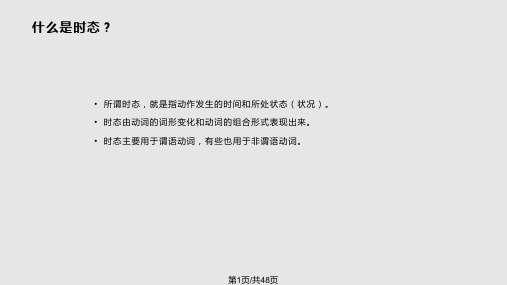动词时态语态讲解课件
合集下载
动词时态PPT课件

It can’t be Jim. he has gone to town . John knows the way well. He has been to the city before .
第25页/共48页
D. 瞬间动词和持续性动词 1. 他来北京五天了。
√ He has been in Beijing for 5
过去将来完成时 现在完成进行时
过去完成进行时 将来完成进行时
过去将来完成进行时
第14页/共48页
三、时态的用法
1、一般现在时:是表述现在或经 常性的动作,状态.
A. 表述现阶段或经常性的动作,状态。 他每天骑自行车上学。
He goes to school by bike every day. B. 表客观真理
days.
× He has come to Beijing for 5 days.
第26页/共48页
D. 瞬间动词和持续性动词
2. 小明入团三年了。
Xiao Ming has been in the League for 3 years.
√
√ Xiao Ming has been a League
member for 3 years
Xiao Ming has joined the League for three years.
×
第27页/共48页
D. 瞬间动词和持续性动词
3. 这本书他买了一年了。
He has had this book
√
for a year.
× He has bought this book
练习。
完 成
先结构,
后改1,
完成 和加1
进行
第25页/共48页
D. 瞬间动词和持续性动词 1. 他来北京五天了。
√ He has been in Beijing for 5
过去将来完成时 现在完成进行时
过去完成进行时 将来完成进行时
过去将来完成进行时
第14页/共48页
三、时态的用法
1、一般现在时:是表述现在或经 常性的动作,状态.
A. 表述现阶段或经常性的动作,状态。 他每天骑自行车上学。
He goes to school by bike every day. B. 表客观真理
days.
× He has come to Beijing for 5 days.
第26页/共48页
D. 瞬间动词和持续性动词
2. 小明入团三年了。
Xiao Ming has been in the League for 3 years.
√
√ Xiao Ming has been a League
member for 3 years
Xiao Ming has joined the League for three years.
×
第27页/共48页
D. 瞬间动词和持续性动词
3. 这本书他买了一年了。
He has had this book
√
for a year.
× He has bought this book
练习。
完 成
先结构,
后改1,
完成 和加1
进行
《动词的时态和语态》PPT课件

例八:
The reporter said that the UFO ___
east to west when he saw it. A A.was travelling B. travelled
C.had been travelling
D. was to travel
在if 、unless等词引导的条件状语从句,when till/until 、as soon as 、the time等词引导的时间
考 查 比 例 较 大 的 几 点
现在完成时
过去进行时
状语从句的动词时态
练习
1. 表示动作已经完成,强调过去 发生的某一动 作对现在造成的影响和结果。一般过去时仅 仅说明动作在过去,不强调对现在的影响。 常与一些时间状语连用:如:already; yet;
by this time; just; ever; never; now; before;
C. has been completed
例十:
If it ___tomorrow, the sports meet will not be held. A. A rains
C. goes to rain
B. will rain
D. shall rain
总结性练习
B 1. When I was at college I ___three foreign languages,but I _ all except a few words of each. A. spoke; had forgotten B. spoke; have forgotten C. had spoken; had forgotten D. had spoken; have forgotten 2. --- Has Tom finished his composition yet? --- I have no idea; he ___ it this morning. A. wrote B. had written C. has written D. was writing 3. --- I haven’t heard from Henry for a long time. C --- What do you suppose ____ to him? A. was happening B. to happen C. has happened D. had happened
【高三一轮复习语法】动词的时态与语态(共28张ppt)

②在条件状语从句和时间状语从句中用一般现在时表将来(主将从现)。 If you leave tomorrow , I'll see you at the airport. 如果你明天走,我到机场送你。 When she comes, I'll tell her about it. 她来时我将把这件事告诉她。 (2)现在进行时表将来 现在进行时表示将来,往往是指计划好或准备要做的事。一些表示动作 转换的动词,如go, come, leave, start, begin,stay,take off,arrive等,或 者也称为位移性动词,其进行时表示马上要做某事。
• He used to get up early . 过去他总是早起。(现在不这样了) • He will be used to getting up early . 他将会习惯早起。 • Wood is used to make paper. 木材被用来造纸。
(三)一般将来时
1、表示将要发生的动作或存在的状态,常用的时间状语有later(on), soon, in a month, next time, from now on, tomorrow等。 I shall be eighteen years old next year. 明年我就十八岁了。 2、一般将来时的其它表示形式 (1)一般现在时表将来 ①按照计划或时刻表要发生的事情。 The new library opens next month. 新图书馆下月开放。 The plane takes off at 3:00 P.m. 飞机于下午三点起飞。
We are about to discuss this problem.我们将马上讨论这个问题。 They were about to leave when the telephone rang. 他们正要离开时电 话响了。
【高考】语法动词的态与语态ppt课件

He looks upset. Do you know why? 他看起来很沮丧。你知道原因吗?
2. 表示客观存在及普遍真理。
综合演练
3. 表示现在经常和习惯性发生的动作,常与 sometimes, often, usually, always, every...等时间状语连用。 4. 一般现在时表将来的动作 (1)在由 when, after, before, as, as soon as, although, if, even if, in case, till, until, unless, as long as, where, whatever, wherever 等引导的时间、条件或让 步状语从句中常用一般现在时表将来。
I haven't eaten anything since breakfast. 我从早餐后到现在一直没有吃东西。
综合演练
3. 现在完成时用于固定句型中 (1)It/This/That is+the first/second/...time that+现在完成时. (2)This/That/It is the+形容词最高级+名词(+that)+现在完成时.
He has died for two years.(错误) He has been dead for two years.(正确)
综合演练
(2)现在完成时与一般过去时的区别 现在完成时强调过去的动作对现在的影响和结果;一般过去时只是对过去 动作的叙述,与现在没有关系。
He hasn't turned off the light yet. 他还没有关灯。(灯还亮着)
I have been calling him many times this morning, but there's no answer. 今天早晨我给他打了很多电话,但是没人接。
英语动词时态语态PPT课件

be going to 表示主观的打算或计划。
I am to play football tomorrow afternoon.
I'm going to play football tomorrow afternoon.
2021/3/9
授课:XXX
14
4.be about to do 表示“正要干什么…”, 1)表示即将发生的动作,不与表示将来的时
English Basic Tenses (时态)
2021/3/9
授课:XXX
1
他每天都来。 He comes every day. 他昨天来了. He came yesterday. 他已经来了. He has come. 他明天来. He will come tomorrow.
汉语借助词汇手段而非词的形态变化来 表示动作的发生,而英语主要通过谓语动词 时态变化来表现.任何句子都要先注意时态.
2021/3/9
授课:XXX
2
时态
语态
主动
一般现在时 一般过去时
v. / v-s/es V-ed
一般将来时 .will + v
过去将来时 would + v.
现在完成时 过去完成时
have / has + done had + done
现在进行时 am /is / are + V-ing
过去进行时 was / were + V-ing
过去
现在
时间线
lived
延续到现在:has lived
last summer
since…
2021/3/9
授课:XXX
23
1.----When did he go to America? ---Oh, he ______ there since half a year ago.
I am to play football tomorrow afternoon.
I'm going to play football tomorrow afternoon.
2021/3/9
授课:XXX
14
4.be about to do 表示“正要干什么…”, 1)表示即将发生的动作,不与表示将来的时
English Basic Tenses (时态)
2021/3/9
授课:XXX
1
他每天都来。 He comes every day. 他昨天来了. He came yesterday. 他已经来了. He has come. 他明天来. He will come tomorrow.
汉语借助词汇手段而非词的形态变化来 表示动作的发生,而英语主要通过谓语动词 时态变化来表现.任何句子都要先注意时态.
2021/3/9
授课:XXX
2
时态
语态
主动
一般现在时 一般过去时
v. / v-s/es V-ed
一般将来时 .will + v
过去将来时 would + v.
现在完成时 过去完成时
have / has + done had + done
现在进行时 am /is / are + V-ing
过去进行时 was / were + V-ing
过去
现在
时间线
lived
延续到现在:has lived
last summer
since…
2021/3/9
授课:XXX
23
1.----When did he go to America? ---Oh, he ______ there since half a year ago.
7-动词时态和语态PPT课件

一般过去时和过去完成时
背诵1 The moment I got home, I found I had left
my jacket on the playground.
完成时和完成进行时的用法比较
即学即练3.
He ________ articles for our newspaper these years, and he ________about 40 articles.
,already,yet,since,for five years,recently
lately,many times,just等。
Step 4 背诵2 一,被动语态的基本用法
A.一般现在时态:am /is/are + done B.一般过去时态:was / were + done C.一般将来时态:will/shall be + done D.进行时态:be being + done E.完成时态:have/has/had been + done F.含有情态动词的被动语态:情态动词 + be + done
opened
2. Jim _______(open) the door ; he found his father watching TV.
3. Shirley __w__a__s_w__r_iting
(write) a book about China last year,
but I don’t know whether she has finished it.
写在最后
成功的基础在于好的学习习惯
The foundation of success lies in good habits
动词时态完整版ppt课件

7
现在完成时
构成:has/have + v-ed
含义:
1.现在完成时所表示的动作在说话之前已完成, 强调对现在造成的影响和结果;
—Good morning,I wonder if you can help.I ________ my
coat.
—Oh,where did you lose it,madam?
university . 二、有些表示“移动”的动词:go , come , leave , arrive , set out , take off 等的过去进行时常表示过去 将来时。 1. John told us they were leaving (leave) for London the next week and that they were coming(come) to say goodbye that evening .
动作。 I'll wait until he has written his letter. If I have finished my homework,I'll go with you.
10
注意1
短暂性动词(如:come ,go ,return , die , join , marry , buy , leave, get, begin , catch , end , finish 等 )可以用于完成时, 但不能与for ,since 构成的短语连用。如:
A.have lost
B.lost
C.had lost
D.lose
8
2.现在完成时所表示的动作开始于过去,持续 到现在,也许还会持续下去。常和for和since这 种表示一段时间的状语,或so far、up to now ,recently/lately、段时间+before,never, already,yet,during/over /in the last/past +时 间等状语连用。
现在完成时
构成:has/have + v-ed
含义:
1.现在完成时所表示的动作在说话之前已完成, 强调对现在造成的影响和结果;
—Good morning,I wonder if you can help.I ________ my
coat.
—Oh,where did you lose it,madam?
university . 二、有些表示“移动”的动词:go , come , leave , arrive , set out , take off 等的过去进行时常表示过去 将来时。 1. John told us they were leaving (leave) for London the next week and that they were coming(come) to say goodbye that evening .
动作。 I'll wait until he has written his letter. If I have finished my homework,I'll go with you.
10
注意1
短暂性动词(如:come ,go ,return , die , join , marry , buy , leave, get, begin , catch , end , finish 等 )可以用于完成时, 但不能与for ,since 构成的短语连用。如:
A.have lost
B.lost
C.had lost
D.lose
8
2.现在完成时所表示的动作开始于过去,持续 到现在,也许还会持续下去。常和for和since这 种表示一段时间的状语,或so far、up to now ,recently/lately、段时间+before,never, already,yet,during/over /in the last/past +时 间等状语连用。
高中英语谓语动词时态和语态最全课件

• 还有几种特殊的形式也表示将来时态:
• 1.be going to+do表示:
• 主观上已经决定、打算、准备要做的事。 例如:I am going to buy a new car. 我打 算买辆新车。
• 某种迹象表明很可能发生的事情。例如: Dark clouds are gathering. It is going to rain.乌云密布,要下雨了。
there by air.
Exercise 2
用现在进行时翻译下列句子。 V.
1. 我星期五动身去北京。 leave / go2ຫໍສະໝຸດ 我的朋友今晚过来。come
3. 下周五我们乘飞机去上海。 fly
4. 下课后我们打算在操场踢足球。 play
1.我星期五动身去北京。 leave / go I’m leaving for Beijing this Friday. 2. 我的朋友今晚过来。 come My friends are coming over this evening. 3. 下周五我们乘飞机去上海。 fly We are flying to Shanghai next Friday. 4. 下课后我们打算在操场踢足球。 play After class we are playing football on the
• 2.be to+动词原型表示:
• 约定、计划或按职责、义务要求即将发生 的动作。例如:
• We are to meet at the train station at four this afternoon. 我们计划今天下午四点在 火车站见面
• The sports meet is to take place on Sunday morning.运动会将在周日上午举 行。
- 1、下载文档前请自行甄别文档内容的完整性,平台不提供额外的编辑、内容补充、找答案等附加服务。
- 2、"仅部分预览"的文档,不可在线预览部分如存在完整性等问题,可反馈申请退款(可完整预览的文档不适用该条件!)。
- 3、如文档侵犯您的权益,请联系客服反馈,我们会尽快为您处理(人工客服工作时间:9:00-18:30)。
2. 过去到现在
①反复发生的事情 I have met so many good teachers since I was young. ※与次数连用时常用完成时
②持续发生的事情 I have been a teacher for 28 years.
现在完成时与一般过去时的误区
-You speak very good french! -Thanks. I ___ French in Sichuan University for four years. A. studied
(09,全国I)Edward, you play so well. But I ______ you played the piano.
A. didn't know B. hadn't known C. don't know
D. haven't known
(09,全国I)Edward, you play so well. But I ______ you played the piano.
动词时态和语态
合肥新东方 陈晓蕾
谓语动词的时态和语态
谓语动词 动词 非谓语动 词
时态、语态 虚拟语气
不定式 动名词 分词 现在分词
过去分词
被动语态
1. 不会脱离时态而存在
2. 不及物动词无被动
3. 主动表被动
主动表被动
①系动词look,feel,sound,smell, taste,seem,appear,go,prove, turn等+形容词/名词。 Ice feels cold.冰摸上去凉。
2. 过去完成时 3. 将来完成时响)
※短暂性动作,模糊的时间状语
I saw the movie last night. I have seen the movie before.
(11安徽)-I didn't asked for the name list. Why _______ on my desk?
1. 过去发生的事(短暂,经常, 持续) 2. 与现在相对比
I don't know. I didn't know. I think. I thought. I forget. I forgot.
..\片段节选\狮子王2didn't know.ra
..\片段节选\狮子王3thought.ra
..\片段节选\六人行1forgot.ra
C. have just finished
D. am just going to finish
-Are you still busy? -Yes, I _____ my work, and it won't last long. A. just finish B. am just finishing
-I put it there just now in case you needed it. A. does it land
B. has it landed
C. will it land D. had it landed
2001年1月18日,克林顿卸职演说
In all the work I have done as president, every decision I have made, every executive action I have taken, every bill I have proposed and signed,I've tried to give all Americans the tools and conditions to build the future of our dreams, in a good society, with a strong economy, a cleaner environment,and a freer, safer, more properous world.
B. don't; would C.don't; will
D.didn't; will
-Ann is in hospital.
-Oh, really? I _____ know. I ____ go and visit her. A. didn't; am going to
B. don't; would
The door won’t lock.门锁不上。 This coat dries easily.这种外衣容易干。
语态 时态
一般现在时
一般过去时 一般将来时
主动
eat/eats
ate will + eat
被动
am /is /are + eaten
was / were + eaten will be + eaten
-How nice! You _____ a different culture then. A. will be experiencing
B. have experienced C. have been experiencing
D. will have experienced
完成时态
1. 现在完成时
3.固定搭配
This is the first time I have won a prize. This is the best movie that I have ever seen.
过去完成时
1. 回顾过去的过去(强调对过 去的影响)
※找参照物是重点(过去的时间,过去 的动作)
(11江西)We arrived at work in the morning and found that somebody _____ into the office during the night. A. broke B. had broken C. has broken D. was breaking
B. study
C. was studying D. had studied
现在完成时与一般过去时的误区
-You speak very good french! -Thanks. I ___ French in Sichuan University for four years. A. studied
将来
1. 一般将来时 2. 将来进行时 3. 将来完成时
一般现在时
1. 现在发生的事情
现在??
2. 经常发生的动作或存在的状态
状态??
一般现在时 1. 规律情况而非具体一次 2. 现在时刻非具体性动作(能力,性 格,特征等) 3. 永恒真理或既定事实,无时间限制 4. 主将从现,主情从现
一般过去时
B. study
C. was studying D. had studied
I _____ in a foreign trade company for five years. Still, I don't regret having given up the well-paid post. A. worked B. have worked C. was working D. had worked
C. have just finished
D. am just going to finish
过去进行时
1. 过去进行的动作 2. be动词的过去进行时表示一 时的表现或状态 3. 过去进行表示过去将来
He was friendly.(长期如此) He was being frienly.(一时的表现) (11全国I) I wasn't sure if he was really interested or if he ______ polite. A. was just being
His plan proved (to be) practical.
②表示开始、结束、运动的词:begin, finish,start,open,close,stop, shut等。 Class begins!开始上课。
Work began at 7 o’clock this morning.上午七点开始工作。
过去将来时
过去完成时 现在完成时
would + eat
had + eaten have /has + eaten
would be + eaten
had been + eaten have /has been + eaten
将来完成时 现在进行时 过去进行时
will have + eaten am /is /are + eating was /were + eating
-I put it there just now in case you needed it. A. does it land
B. has it landed
C. will it land D. had it landed
(11安徽)-I didn't asked for the name list. Why _______ on my desk?
The shop closes at 6 p.m. every day.
每天下午6点关店门。
③表示主语的某种属性的词:read,write, act,cut,draw,drive,sell,wash, clean,wear,open,cook,lock, look,shut等。
The books sell well.这些书畅销。
B. will just be
C. had just been D. would just be
I am leaving.
